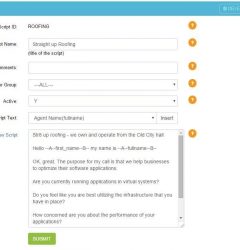
Satisfying Culture & Customer Service
A call center is, in most cases, the only human interaction that a customer has with the business. These interactions largely impact the customer’s view and feelings associated with the business.
While customers can have other feelings associated with the company based on live chats, the website, social media, etc, their viewpoint can quickly change positive or negative with just one bad interaction with a call center. This is because, with a call, you can hear the person’s tone of voice, their word choices, their pauses to listen, which all adds up to determine their level of care for the customer.
The level of customer service is almost always linked to the culture of the company. If the agents are treated with respect, share the beliefs and values of the company, and have a supportive team, then the outcome is better customer service. When the agents are taken care of, their focus can rely solely on the customer, however when the opposite is true and the agent feels uncared for, then their first priority is meeting their own needs/wants. The key to building a call center culture for effective results is by making the agents the first priority, so they can focus on the customers.
Successful Call Center Agents
Besides having a positive work culture, employees also need certain traits and competencies to be successful call center agents. While a lot of the job skills are learned, there are a few skills that the person should naturally be good at. For Instance:
- Communication – Agents need strong communication skills. They are speaking with customers and other agents all day and if they are not skilled at relaying information, sharing information promptly, or receiving information effectively, then they will struggle to do the job well.
- Memorization – Agents need to be able to retain information easily, because they need to be able to maneuver programs/databases, recall needs/wants of their leads, and remember other relevant information pertaining to the job.
- Speed/Multitasking – This job role is incredibly fast paced. While you’re helping a customer you are also taking notes, finding documents to share information with the customer and possibly checking to see who the customer needs to be transferred to after you have answered their questions. Finding someone comfortable with a fast paced environment is ideal for this position.
- Organization – With all the information an agent receives in a day, they have to have some kind of method for keeping organized. Otherwise, leads would get poor attention, information would get lost, and nothing would get done in a timely manner. Having a natural skill for organizing is important for keeping up with every aspect of the job.
Good Call Center & Sales Manager
Setting your agents and company up for success also requires that you, as the manager, set yourself up for success. How might one do that, you ask? Well, you start by managing your inbound call center with:
- Expectations
- Here is where you have to find a happy medium. If the expectations are not high, then your results won’t be very high either. If the expectations are too high, then you are discouraging the agents from even attempting to reach the expectations.
- Training
- Training does not stop once they have finished the orientation phase. Training must be continuous and it would be wise to continue your training as well.
- Analytics
- Data and reports are facts that determine results you are receiving and help you decide how you can improve in the future.
- Preparedness
- Expect the worst, but prepare for the best. It’s great to be optimist but you have to also have a realistic mindset in business. Market trends, the economy, etc, will prove over and over again the importance of being prepared for the everchanging future.
- Efficiency
- Coaching, monitoring, and communication, all make for better efficiency in the workplace.
But, how do you improve your own skills, as the manager? That can be answered too! There’s managers and then there’s good managers. Good manager skills consist of:
- Intuition – Knowing quickly what to do for any circumstance like hiring, firing, or making business decisions.
- Knowing what motivates agents – Each agent might be motivated by different things (EX: time off, a raise, a gift) By understanding the motivation behind your agents you can help them succeed AND boost morale.
- Giving feedback – Negative feedback is needed but positive feedback is needed even more to keep spirits high and to encourage the continuation of that action or behavior.
- Knowing the right tools – For example: CRM Software, Sales Prospecting Software, Cloud Calling Software, Sales Analytics Software, and Marketing Automation Software.
- Monitoring the right metrics – Metrics help you make informed decisions about what is successful and what needs improvement.
- Building relationships & creating a positive culture – Your management style reflects the culture whether negative or positive. Therefore, you get to decide the culture by how you interact and manage the people in your call center.
- Defining a working process – This creates organization, stability, and helps to easily regulate tasks from qualifying leads, interacting with leads, and sending leads through the sales pipeline.
- Providing Training – Whether you’re the manager because you are the most qualified or whether you were the best call center agent at one time, you have valuable knowledge and skills that need to be taught to your team. Seeing areas for improvement in your staff and then providing adequate training is essential to build your team.
- Setting a high bar/high standards – You should have high standards that are achievable yet give the staff a challenge to rise up to. You should also have the highest standards for yourself, so you can lead by example.
- Never stop learning – The industry will never stop changing, will never stop improving. You have to make it a point to stay informed and adapt to the changes.
Quality Reporting & Analytics
As briefly mentioned above, using the right metrics to monitor the success of your team is crucial to the development and growth of your sales and the team. Due to this truth, we are suggesting implementing these 9 call metrics to track:
- Calls until conversion: The number of calls it takes to secure a sale.
- Calls per hour: The number of calls an agent makes within an hour
- Call outcome: The call outcome can be (voicemail, hung up, not interested, disconnected, interested, or sale). Looking at the number of each of the outcomes helps determine the success the agents are having.
- Follow-up per lead: The number of follow-ups it takes to secure a sale.
- Voicemail returns: The number of returned calls due to a voicemail drop.
- Handel time: The time spent with customers on the phone.
- Agent satisfaction: The agent’s perspective on how the call went. Can be as simple as (negative, positive, or neutral)
- Cost per call: The cost the company pays per call.
- Number of metrics you are tracking: We suggest using a small list of metrics to track, instead of trying to track many. This is because they lose their effectiveness if you try to track too many metrics all at once.
All of these metrics can then be translated into a sales call report template. In most cases a call report will identify the who, what, and when of a sales call. It can also include important information like who the decision maker is, who’s the competition, the estimation of time of closing the sale, the necessary steps to do after the call to close the sale, etc. If used correctly, the sales call template will give the most valuable information to help the sales agent close the sale or move the lead further down the sales pipeline.
The Right Call Center Software
The last element needed to make a good call center requires getting the right call center software. Good call center software will have features like automatic dialing, contact management, voicemail drops, email, SMS, reporting, and more. Through the use of software, call centers are able to create campaigns easily, manage users/reports/data, and monitor/whisper coach.
By allowing the software to automate the daily repetitive task you and your agents will have much more time to spend on potential clients! A good call center software can and will enhance your work. Try out Dolphin Power Dialer for Call Centers for free!
Works Cited
Brandon, L., 2021. Call Center Environment: How to Build It Effectively | EVS7. [online] EVS7. Available at: <https://www.evs7.com/blog/building-call-center-culture> [Accessed 3 September 2021].
Montgomery, J., 2021. Sales Call Reports Template (Free) | EVS7. [online] EVS7. Available at: <https://www.evs7.com/telemarketing/how-to-create-useful-sales-call-reports-template> [Accessed 1 September 2021].
Brandon, L., 2021. Traits That Make A Good Call Center Agent | EVS7. [online] EVS7. Available at: <https://www.evs7.com/call-center/traits-that-make-good-call-center-agent> [Accessed 2 September 2021].
Montgomery, J., 2021. 9 Call Metrics Sales Managers Should Track + Examples | EVS7. [online] EVS7. Available at: <https://www.evs7.com/telephone-answering-service/9-call-metrics-sales-managers-should-track> [Accessed 1 September 2021].
Brandon, L., 2021. Managing an Inbound Contact Center Like a Boss. [online] EVS7. Available at: <https://www.evs7.com/blog/managing-inbound-contact-center> [Accessed 2 September 2021].


